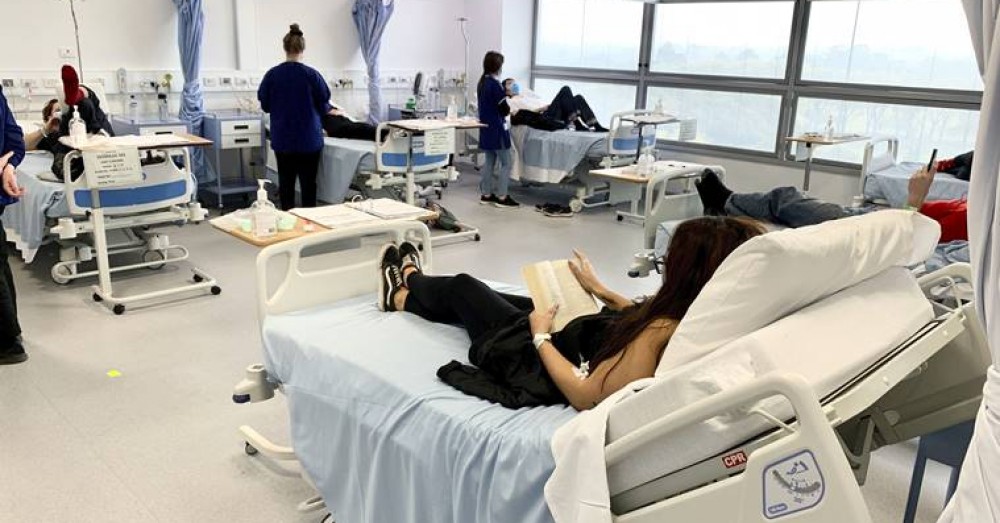Coronavirus (Covid-19) vaccine latest update: With developing a safe, effective and accessible vaccine for Covid-19 being seen as the key to contain the pandemic, research and trials are going on at a fast pace across the world to find a cure for the novel coronavirus.
In latest developments, US company Moderna Inc, one of the front runners in the vaccine race, has said it had started dosing patients in a mid-stage study while Russian scientists plan to start clinical trials within two weeks.
Around 120 vaccines are in the works across the world, of which at least 10 are undergoing human trials even as cases worldwide crossed the 60 lakh mark, including 369,254 deaths. Till date, China’s CanSino adenovirus vaccine, Oxford University’s adenovirus vaccine, Moderna’s mRNA vaccine and Novavax have emerged as the top most promising vaccine candidates for Covid-19.
Coming to India, where cases touched 1,82,143 on Sunday after reporting 8,380 new infections in 24 hours,Baba Ramdev’s Patanjali group has joined the global efforts of developing a cure for Covid-19, PTI reported.
Coronavirus (Covid-19) latest updates:
💉 A Chinese vaccine, being jointly developed by the Beijing Institute of Biological Products and China National Biotec Group Co, has completed phase II testing and may be ready for the market at the end of this year or early next year, according to a report published by the State-owned Assets Supervision and Administration Commission.
The report, quoted by Reuters, said the production line for the vaccine would be fully disinfected would have a full manufacturing capacity of 100 million-120 million vaccines each year. The vaccine candidate employs a killed version of the novel coronavirus that can still trigger an immune response.
In total, five vaccines developed by Chinese companies are being tested on humans, the most in any country.
💉 Another Chinese biopharmaceutical company Sinovac Biotech has pinned hope on its inactivated vaccine, dubbed CoronaVac, and said it was 99 per cent sure of its efficacy. As per a Sky News report, Luo Baishan, a researcher at Sinovac, said, “It must be successful…99 per cent sure.”
The company has reached stage 2 of its vaccine trial, with more than 1000 volunteers participating. The company is in preliminary talks to hold stage 3 trials – the final part of the process in the UK.
In a report in the academic journal Science last month, Sinovac said its vaccine protected monkeys from infection by the coronavirus.
Sinovac’s research and development subsidiary has received $15 million from private equity firms Advantech Capital and Vivo Capital to fund the development of the vaccine. Besides, the company has also been assigned a large factory to produce its coronavirus vaccine, with an aim of being able to produce 100 million doses.
💉 US firm Moderna Inc recently said it had started dosing patients in a mid-stage study with its experimental coronavirus vaccine and eventually plans to enroll 600 patients for the trial. The move signals that the company’s mRNA vaccine has passed its initial safety checks. Moderna plans to begin late-stage trials in July, Reuters reported.
In a press statement, Moderna said the first participants in each age group of the trial — adults below and above age 55 — had received doses of the company’s candidate.
Earlier this month, Moderna had released early-stage data that showed the vaccine successfully produced protective antibodies in a small group of healthy volunteers.
However, last week, a report highlighted the side effects in a volunteer taking part in a trial. A volunteer told STAT News that he started getting chills within hours of getting home from his second dose and had nausea and aching muscles.
💉 Russia, which has the world’s third-highest Covid-19 toll after the United States and Brazil, has said it planned to start clinical trials within two weeks on a vaccine. Moreover, authorities also approved the country’s first anti-Covid-19 drug, a Reuters report said.
Kremlin officials said the nation’s researchers were working on almost 50 different vaccine projects. “The tests are under way and we plan to start clinical trials in the next two weeks,” Health Minister Mikhail Murashko was quoted as saying by the TASS news agency. He said volunteers had been selected to take part in the trials.
One of the vaccines is being developed by the state-run Vektor Institute in Siberia. On Saturday, its director general Rinat Maksyutov said he hoped to complete clinical trials in mid-September. Maksyutov said vaccine trials on animals had been successful.
Meanwhile, the Russian Direct Investment Fund said the Health Ministry had approved Avifavir for the treatment of Covid-19. It was developed on the basis of a drug known generically as favipiravir. The drug has proved highly effective in treating patients in the first phase of its clinical trials. The final stage of clinical trials is under way, with the participation of 330 patients.
💉 US pharmaceutical giant Pfizer has said a Covid-19 vaccine, which is being jointly developed with German firm Biontech, could be ready by the end of October 2020.
“If things go well, and the stars are aligned, we will have enough evidence of safety and efficacy so that we can…have a vaccine around the end of October,” Albert Bourla, the CEO of the firm, said at an event.
Pfizer is conducting clinical trials in the US and Europe for the BNT162 vaccine programme. The programme includes four vaccine candidates, each representing a different combination of mRNA format and target antigen.
“The short, less than four-month timeframe in which we’ve been able to move from pre-clinical studies to human testing is extraordinary,” he further said.
Share This Post















